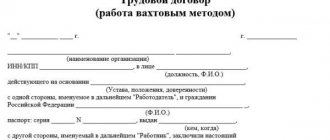Who is the director
Regardless of what company the director heads - a small company or a large organization - he is the sole executive body of the legal entity . The position may be called differently, but this does not change the essence. A small company is headed by a director or CEO, while a corporation may have a president. Moreover, there may be several directors: financial, commercial, and so on. But there is always one main person to whom all other leaders report. Most often this is the CEO.
Nuances of the agreement with the manager
Whatever the name of the position, from the employer’s point of view, the manager is the same hired person as other employees. Therefore, the provisions of the employment contract with the director, in general, do not differ too much from the agreement with persons occupying other positions. But still there are some peculiarities.
Only an organization can enter into an agreement with the director . This means that an individual cannot hire a director. That is, there is no such thing as “director of an individual entrepreneur,” since this is not a form of organization, but the status of an individual. The main manager and responsible person in his business is the entrepreneur himself.
When drawing up an agreement with the director, you should be guided by the norms of the Labor Code, legislative acts of the Russian Federation and your region, as well as internal documents of the company. The agreement is drawn up in writing and signed on the part of the employer by the founder (if there is one) or the head of the general meeting of shareholders (owners).
Like any employment contract, the agreement with the director must include a number of mandatory provisions :
- date and place of his imprisonment;
- job title;
- job description;
- information about wages and compensation due to the manager;
- information about the probationary period;
- details of the employing organization and passport details of the director.
Note! A probationary period is applied only if the condition for its existence is specified in the employment contract.
But there are special clauses that should appear in the contract with the director, unlike other employees:
- provision on trade secrets and what penalties will arise if they are disclosed;
- provision for compensation in the event of termination of employment relations with the manager (this amount cannot be less than 3 months’ earnings);
- if the director's salary exceeds a quarter of the value of the organization's assets, the contract must be approved by the advisory body.
But the provision that the director bears financial responsibility is not at all necessary in the contract. The fact is that this responsibility arises by force of law, regardless of whether these provisions are spelled out in the contract or not.
Special status of the employee
The main difference from other employment options for other positions (for example, when hiring a commercial director or sales director) is due to the fact that the general director is not accountable to any specialist hired on staff. The circle of people to whom the general director reports is limited to business owners, i.e. founders. Since the founder and the director are often the same person, difficulties arise in correctly registering hired labor with the founding general director.
In addition to the general provisions of federal legislation regarding employment, special regulations are applied to such an employee concerning the specifics of the activity and the peculiarities of the legal status of the manager, as well as clauses from the constituent documents that define the range of duties, powers and responsibilities of the manager.
The specificity of accepting a position is that it is elected. The head of the company is accepted based on the results of a competition or upon successful election in elections organized by the founders.
Unlike other employees, the appointed employee undergoes a probationary period of up to 6 months. This duration is due to the need to get up to speed and understand the specifics of the enterprise’s work, to learn its nuances.
Other differences include the impossibility of drawing up an open-ended contract if the statutory documentation defines a specific period of employment and no other option other than a fixed-term employment contract with the general director is provided. Although the law does not prohibit dual employment for general directors, the special nature of the powers and responsibilities prescribes that each case of dual employment must be coordinated with the persons to whom the director is accountable, i.e. with the founders.
The position does not imply indefinite employment, therefore periodically, before the expiration of powers, documents are re-signed. And the person who enters into an employment contract with the director is determined based on specific circumstances.
Hired director
If the director is registered as a hired employee, his employment takes place in strict accordance with the general registration scheme under the Labor Code of the Russian Federation, with the provision of a similar package of documents and the signing of documents usual for such cases.
If the hired director decides to formalize an external part-time job, other rules apply. It is impossible to do without obtaining the consent of the business owners, obtained in writing. If it is planned to combine the responsibilities of the head of an organization with a part-time commercial director within the same legal entity, employment is formalized in accordance with the internal regulations of the enterprise and the constituent documents indicating the powers of the general manager. director.
Download the Employment Agreement with a part-time director (form) (46.0 KiB, 491 hits)
Sample employment contract with a part-time general director (27.8 KiB, 645 hits)
Who chooses the director
A candidate for the position of director is selected or appointed depending on the form of ownership of the legal entity. The Labor Code provides several methods for electing/appointing a manager:
- Conducting a competition . This option is mandatory for state and municipal unitary enterprises.
- Election at a meeting of members or the Board of Directors. Suitable for commercial organizations where there are several participants or a collegial board.
- Appointment by the founder. This is how the candidacy of a director in an LLC with one participant is determined. Quite often in this case, the founder appoints himself as director, but another person can also be hired.
At the same time, the Code does not contain a closed list of procedures, that is, the director can be appointed in some other way.
Commentary to Art. 275 Labor Code of the Russian Federation
Comments on articles of the Labor Code will help you understand the nuances of labor law.
§ 1. New edition of Art. 275 contains a reference to Part 2 of Art. 59, allowing the conclusion of a fixed-term employment contract with an employer.
As before, its duration is determined by the constituent documents of the organization or by agreement of the parties (usually fixed in the employment contract).
In Part 2 of Art. 275 clarifies the range of acts that can establish procedures prior to concluding an employment contract with a manager. These include: labor legislation (i.e. laws of the Russian Federation and constituent entities of the Russian Federation - see Article 5 of the Labor Code), other regulatory legal acts containing labor law norms (see ibid.), constituent documents (charters, regulations on the organization) .
§ 2. Article 275 of the Labor Code determines the legal nature of the relationship between the manager and the organization.
Since they are formalized by an employment contract, these relations are labor relations and are regulated by labor legislation with the features provided for in Chapter 43 of the Labor Code.
§ 3. The laws and constituent documents of the organization determine the name of the head of the organization (director, general director, president, etc.) and the procedure for hiring him - appointment, approval, election - with the subsequent conclusion of an employment contract with him.
Based on a combination of appointment, approval, election and employment contract, an employment relationship arises between the manager and the organization.
On the emergence of labor relations on the basis of an employment contract as a result of election (elections) to a position, see Art. 17 TK; on the basis of an employment contract as a result of his election through a competition, see Art. 18 TK; on the basis of an employment contract as a result of appointment to a position or confirmation in a position, see Art. 19 TK.
§ 4. The election, appointment, approval of an individual as the head of an organization is carried out by an authorized body.
The general director (director) of a joint-stock company is elected by the general meeting of shareholders or appointed by the board of directors (supervisory board) in accordance with the charter of the joint-stock company (see Federal Law of December 26, 1995 “On Joint-Stock Companies,” with subsequent amendments // SZ RF. 1996. N 1. Art. 1).
The election of the general director (president) of a limited liability company is the exclusive competence of the general meeting of the company’s participants (see paragraphs 2, 4 of article 32 of the Federal Law of February 8, 1998 “On Limited Liability Companies” // SZ RF. 1998. N 7. Art. 785).
The right to conclude contracts with the heads of federal state unitary enterprises is granted to federal executive authorities in agreement with the Ministry of State Property of the Russian Federation (see paragraph 1 of the Decree of the Government of the Russian Federation of March 16, 2000 N 234 “On the procedure for concluding contracts and certification of heads of federal state unitary enterprises” / / SZ RF. 2000. N 13. Art. 1373; 2001. N 31. Art. 3281; 2002. N 4. Art. 3986; 2006. N 13. Art. 1408; Regulations on the Ministry of Property Relations of the Russian Federation, approved by Resolution Government of the Russian Federation dated June 3, 2002 N 377 (SZ RF. 2002. N 25. Art. 2178)).
On October 4, 2002, by Decree of the Government of the Russian Federation N 738, significant changes and additions were made to its Decree of March 16, 2000 N 234. In particular, the word “contract” was excluded from the text of the Decree of the Government of the Russian Federation of March 16, 2000, mentioned above (SZ RF. 2002. N 41. Art. 3986).
In connection with the entry into force of the Labor Code of the Russian Federation, the Federal Law “On State and Municipal Unitary Enterprises” (SZ RF. 2002. N 48. Art. 4940), in pursuance of the Decree of the Government of the Russian Federation of October 4, 2002 N 738 and taking into account the Decree Government of the Russian Federation dated April 10, 2002 N 228 “On measures to increase the efficiency of use of federal property assigned to the economic management of federal state unitary enterprises” (SZ RF. 2002. N 15. Art. 1440) by order of the Ministry of State Property of the Russian Federation dated December 11, 2003 . N 6946-r approved a new model employment contract with the head of a federal state unitary enterprise (Bulletin of the Ministry of Labor of the Russian Federation. 2004. N 6. P. 77). The same order invalidated the previous acts of the Ministry of State Property of the Russian Federation on this issue - orders dated February 16, 2000 N 189-r and orders dated June 9, 2000 N 50-r (Bulletin of normative acts. 2000. N 13, 34).
On December 3, 2004, the Government of the Russian Federation adopted Resolution No. 739 “On the powers of federal executive bodies to exercise the rights of the owner of the property of a federal state unitary enterprise” (SZ RF. 2004. N 50. Art. 5074; 2006. N 13. Art. 1408) . In accordance with paragraph 1 of Art. 2 of the Federal Law “On State and Municipal Unitary Enterprises”, the Government of the Russian Federation decided that federal government bodies in relation to federal state unitary enterprises under their jurisdiction that are subject to preservation in federal ownership or included in the forecast plan (program) for the privatization of federal property of joint-stock companies, it is intended to contribute to the authorized capital of other joint-stock companies or remain in federal ownership. It (the Government of the Russian Federation) carries out, in particular:
a) approval of the charter of the enterprise (with the exception of the federal government enterprise);
b) appointment to the position of the head of the enterprise, conclusion, amendment and termination in the prescribed manner of an employment contract with him;
c) measures to ensure certification of the head of the enterprise;
d) approval of the employment of the chief accountant of the enterprise, conclusion, amendment and termination of an employment contract with him.
In relation to other enterprises, these powers are exercised by the Federal Agency for Management of Federal Property, taking into account proposals received from federal government bodies.
The Federal Agency for Federal Property Management in relation to federal unitary enterprises carries out, in particular: conclusion, modification and termination in the prescribed manner of an employment contract with the head of the enterprise from the date of inclusion of the enterprise in the forecast plan (program) for the privatization of federal property, except in cases where the shares of the enterprise created through its transformation into a joint-stock company is expected to be included in the authorized capital of other joint-stock companies or retained in federal ownership (subparagraph “d”, paragraph 2 of the Decree of the Government of the Russian Federation of December 3, 2004 N 739).
The same Resolution stipulates that when conducting certification of heads of federal state unitary enterprises subordinate to federal government bodies, whose activities are managed by the President or the Government of the Russian Federation, the formation of certification commissions is carried out by these bodies. In relation to federal state unitary enterprises subordinate to federal executive authorities and under the jurisdiction of federal ministries, these commissions are created by the relevant ministries (clause 4 of the said Resolution of the Government of the Russian Federation).
The Ministry of Economic Development of the Russian Federation is entrusted with the obligation to approve, within three months from the date of publication of this Decree of the Government of the Russian Federation, a sample employment contract with the head of a federal state unitary enterprise and a sample charter of such an enterprise based on the right of economic management (see paragraph 5 of the Decree of the Government of the Russian Federation of December 3, 2004 . N 739).
Obviously, until its approval, the sample employment contract with these employees, previously approved, remains in force.
In private organizations, a manager can be hired by the owner of the property of this organization (see Article 279 of the Labor Code) or by a person (body) authorized by the owner to take these actions.
§ 5. The powers to approve, appoint, elect and conclude an employment contract with the head of the organization may belong to the same body (person) or are divided between different bodies (persons) by legislation and constituent documents.
Thus, in accordance with the Charter of the open joint-stock company "Russian Railways", approved by Decree of the Government of the Russian Federation of September 18, 2003 N 585 (SZ RF. 2003. N 39. Art. 3766), the president of the company is appointed to the position (for a period of 3 year) and is dismissed from office by the Government of the Russian Federation. The competence of the board of directors includes determining the essential working conditions of the chairman of the board of the company and members of the board of the company, establishing the amount of remuneration and compensation for the chairman of the board of the company and members of the board of the company, agreeing on issues of combining positions in the management bodies of other organizations; appointment of first vice-presidents of the company and termination of their powers (clauses 71, 72, 80 of the Charter).
§ 6. The terms of the employment contract with the manager are determined by legislation, other regulatory legal acts, agreement of the parties, i.e. the employment contract itself.
On remuneration of heads of organizations, see Art. 145 TK.
For what period is the contract concluded?
Typically, an employment contract is for an indefinite period - this applies not only to the director. Only employment agreements that are temporary in nature have a term. For example, when a specialist is hired to replace an employee who has been absent for a long time. In this case, the period is determined by agreement of the parties and in accordance with the constituent documents of the employer. The contract must indicate why it is urgent. The maximum period for which a fixed-term employment contract can be concluded is 5 years.
Article 274. Legal basis for regulating the work of the head of an organization
The rights and responsibilities of the head of an organization in the field of labor relations are determined by this Code, other federal laws and other regulatory legal acts of the Russian Federation, laws and other regulatory legal acts of the constituent entities of the Russian Federation, regulatory legal acts of local government bodies, constituent documents of the organization, local regulatory acts, labor agreement.
(as amended by Federal Law No. 90-FZ of June 30, 2006)
Responsibility
The director, as a person making management decisions, bears financial responsibility. This is regulated by Article 277 of the Labor Code of the Russian Federation. There are no requirements to specify the corresponding provisions in the contract, but for information they can be included in it. Liability arises regardless of the presence of such provisions in the employment contract or the conclusion of an additional agreement on financial liability with the director. It occurs for damage or theft, as well as for losses caused by the actions or inaction of the manager.
Can the founder enter into an agreement with himself?
Very often the question arises of how to formalize the appointment of a director if he is the only founder. The legislation does not give a clear answer. There are no rules that would allow or prohibit this approach, so the issue is decided by the founder himself.
Let us note that the Ministry of Finance considers concluding an agreement with oneself to be unlawful (letter dated March 15, 2016 No. 03-11-11/14234). Officials explain that if the director and the founder are the same person, the fact of appointment must be formalized by the decision of the sole founder. But letters from the Ministry of Finance, as is known, are not legal acts, so the department’s opinion cannot be recognized as the unequivocally correct answer.
There are two points of view:
- The Labor Code does not say that labor legislation does not apply to relationships with the head of the organization. This means that an employment contract must be concluded with the director. After all, for an employer, a director is almost the same employee as everyone else. This means that a fine may be imposed for the lack of agreement during labor inspections. Conclusion: despite the opinion of the Ministry of Finance, it is safer to enter into an agreement with yourself . In this case, the person signs both on behalf of the founder and on behalf of the director.
- A contract with oneself has no meaning and is invalid. If the founder and director are the same person, then there is no need to conclude an employment contract. Moreover, payment of wages in accordance with such an agreement may be regarded as unreasonable expenses.
What to do? The safest option is to enter into an agreement with the director, but not include the costs of his salary in the income tax base.
Common mistakes
Error: The only founder who hires himself for the post of general director, in both cases indicated the details of the legal entity in the details of the parties to the employment contract.
Comment: Despite the fact that the actual founder hires himself, the employment contract must, on the one hand, contain the details of the employer as a legal entity, and on the other hand, the details of the director (founder) as an individual must be specified.
Error: The sole founder decided not to enter into a contract with himself as the CEO on the basis that the law requires a bilateral employment contract.
Comment: It is necessary to conclude an agreement with the director of the LLC no later than the first 3 days of the start of the enterprise’s activities, and therefore it is necessary to have an employment contract even with yourself.
Features of an agreement with a director in a state organization
When applying for a job as a director of a government institution, he, like any employee, must
- obtain a passport, work book and tax identification number. In addition, he must submit: a certificate of his own income and property;
- a similar certificate regarding the income and property of the spouse and minor children.
Certificates are submitted at the time of hiring and are updated annually.
You should know that a contract with the head of a state organization must be concluded according to the standard form from Government Decree No. 329 of April 12, 2013. But an employment agreement with the director of a commercial company can be developed independently - there is no standard form provided.
Features of signing an agreement
Since the fate of the entire enterprise depends on the decisions of the manager, it is worth carefully studying the contents of the contract and taking a responsible approach to the issue of its preparation.
Agreement with the general The director describes the functions transferred to the person, and also establishes the possibility of combination. Often in small organizations such an employee also acts as a chief accountant.
The document is signed, in addition to the manager himself, by the chairman of the meeting of founders, an authorized person elected as chairman of the Board of Directors.
Download the Employment Agreement with the General Director (sample) (78.0 KiB, 795 hits)
Content
To avoid big troubles associated with wrong decisions or mistakes in the work of a hired manager, you will have to approach the issue of drawing up a contract responsibly. The provisions of the signed form must be based on:
- general norms of labor legislation;
- the contents of the constituent documents.
Sample agreement with the general. the director must have the following details:
- name of the organization and full name of the manager being hired (in full);
- company tax identification number;
- information about the person who signs the document on behalf of the employer and the grounds for the emergence of such a right;
- day of signing the document, place of registration;
- responsibilities of an employee;
- description of the place of work;
- period of validity of the agreement.
A fixed-term employment contract with the general director can be concluded for a longer period than provided for by the Labor Code of the Russian Federation (5 years), if this is mentioned in the constituent document.
Before concluding a contract, you should pay special attention to the inclusion of the following points:
- day of taking office;
- the procedure for payment for work performed;
- issues of payment of social contributions (through Social Security).
The standard sample agreement does not contain details specific to a particular business, therefore the parties have the right to include additional clauses if they do not contradict legislative acts and the provisions of the charter.
Brief information about the stages of registration of the gene. directors
The legitimacy of the manager’s activities depends on compliance with the rules established by the legislation of the Russian Federation when hiring.
The scheme for hiring a general director includes the following steps:
- Checking for restrictions on employment for a managerial position of a specific candidate (it is known that such restrictions are imposed by the “bankrupt” status).
- Form and check the submitted package of personal documentation.
- A meeting of the founders is organized and held, at which a decision is made to appoint the candidate as general director.
- Based on the decision made, a contract is signed for a limited period of time.
- Next, the personnel service or other responsible employees of the enterprise draw up the remaining documents for the new manager and enter into the employment record the acceptance of the head as head.
It is important to remember that when there is a change in the general manager, it is necessary to notify the tax authorities in a timely manner by sending official papers to them. Since the main signature right remains with the general director, adjustments will have to be made to other types of reporting, in addition to tax reporting.
Dismissal of the director
So, the director is a difficult worker. Moreover, the company cannot function without it. However, he can be dismissed on general grounds, like any other employee of the organization. Moreover, Article 278 of the Labor Code of the Russian Federation provides additional grounds for dismissal of a director :
- in accordance with the requirements of bankruptcy legislation (the director is dismissed due to removal from office);
- in accordance with the decision of the owners or authorized body of the organization; on other grounds specified in the employment contract.
However, there are cases when a director cannot be fired . However, this applies to any employee of the organization. All such situations are somehow related to children. You cannot fire:
- a woman during pregnancy;
- a woman with a child under three years of age;
- single mother of a child under 14 years of age or a disabled child under 18 years of age;
- another person who is raising a child under 14 years of age or a disabled child under 18 years of age without a mother;
- a person who is the sole breadwinner of a child under 3 years of age, if there are three or more children in the family, or a disabled person under 18 years of age.
This does not mean that the persons mentioned cannot be fired. For this, there are special grounds for their dismissal, provided for in Articles 81 and 336 of the Labor Code of the Russian Federation.
An employment contract cannot be terminated if the employee is on vacation or sick leave. The exception is the liquidation of the company.





